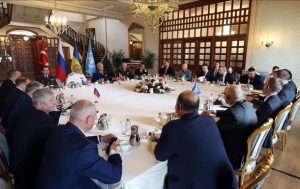On July 13, for three and a half hours at a meeting in Istanbul, delegates from Ukraine, russia, Turkey and the UN held negotiations on the possibility of unblocking the export of grain from Ukrainian ports. This is reported by mind.ua.
The meeting was closed, there were no official statements after it. The Ministry of Defense of Turkey in a short communiqué simply stated that “the meeting has come to an end.” However, some of the information — sometimes contradictory — still leaked into the public sphere.
Here is what has become known about the prospects of restoring grain exports through Ukrainian ports.
1. We are talking about the unblocking of three Ukrainian ports — Odesa, Chornomorsk, and Yuzhnoye. The previous mechanism provides for the escorting of transport ships by the Ukrainian side to neutral waters through a safe corridor. The rest of the water area remains mined. The Turkish side undertakes the function of inspecting ships entering Ukraine for grain in order to exclude their supply of weapons.
2. A cease-fire regime is in effect within the stipulated geographical limits.
3. The UN will establish a command and control center in Istanbul to monitor the level of threats to the vessels.
4. Timing: A formal agreement will be signed next week at a follow-up meeting in Turkey. At the same time, UN Secretary General Antonio Guterres said that “additional technical work will be needed to materialize today’s progress.” The demining process will last several weeks. The most optimistic forecast for the start of shipping from Ukraine is the second half of August.
5.Ukraine prioritizes security guarantees – reliable enough to exclude the possibility of an attack on Odesa once the water area is demined. To date, nothing is known about the format of such guarantees.
6. The negotiations in Istanbul concerned exclusively grain issues, no military topics were raised; there are no peace talks with moscow.
7. russia put forward additional demands to ensure its own grain exports: the impact of sanctions in the insurance, logistics and banking spheres for the export of Russian agricultural products was discussed.
8. The conclusion of an agreement to unblock exports is considered important for food security, especially among developing countries, and for stabilizing prices in markets. Meanwhile, the issue of the food crisis is gradually losing its sharpness. World prices for agricultural products, like most other commodities, have returned to pre-war levels. Wheat has fallen in price by 40% compared to the March maximum. The reduction of the influence of the food lever could encourage russia to demonstrate a gesture of “goodwill”.
9. The risks of famine and political instability remain high for the poorest and poorest countries, primarily in Africa. Given the broad interests of China on this continent, the version about the unspoken pressure of the People’s Republic of China on russia to ensure the flow of food and maintain stability is gaining popularity.
10. The possibility of unlocking Black Sea ports is far from 100%. The absence of clear statements on the results of the negotiations from the most interested party — Ukraine — and the silence of russia are symptomatic.









